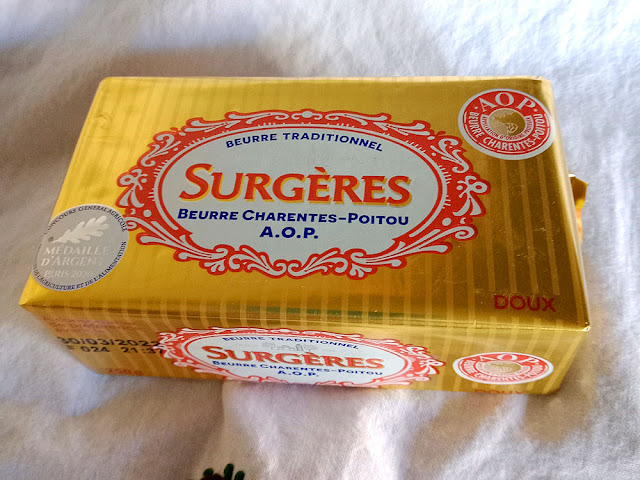I live in central France and like to buy local, so you would expect my usual choice of butter to be that made in the nearby co-operative at Verneuil. It's good butter and I like it, but we like salted butter, and the supermarket I shop at only stocks unsalted Verneuil butter. So I go for another good local choice -- beurre Charentes-Poitou, which has a certification which guarantees it is from a particular geographic area and made to a certain standard.
 |
| Grand Fermage brand Charentes-Poitou butter, sold by both SuperU and Intermarché locally. |
Beurre Charentes-Poitou is made exclusively from milk from cows in herds of an average size of 82 head, in Charentes, Charente-Maritime, Deux-Sevres, Vienne and Vendée. The supermarket where I normally shop is actually in Vienne, as we live very close to the borders of three départements (counties).
 |
| This is what the butter looks like unwrapped. |
The method used to make the butter is a sort of industrialised version of the old traditional way butter was made on farms here. The milk is heated to 40C which makes the cream rise and it is taken off by centrifugal action. It is then pasturised, which unfortunately has the effect of killing off the natural lactic bacteria as well as any bad bacteria. So cultured lactic bacteria are added and the cream is allowed to mature for 15 hours whilst being carefully temperature controlled. This is the most important stage of the process and what makes the taste so distinctive. Then it is churned in a modern version of the traditional barrel with internal paddles, washed to remove all traces of the acidic buttermilk and kneaded to create a smooth homogenous paste. Finally it is shaped into blocks, wrapped and refrigerated.
The end product is a rich creamy butter with a delicate nutty flavour. There are no additives permitted apart from the salt and the lactic culture.
 |
| Echiré brand, made in Deux-Sevrès. |
The maritime climate of the Poitevin countryside is ideal for producing pasture, hay and feed seed for dairy cows. These days the cows are mostly Prim'Holstein, developed from the familiar big black and white Dutch dairy cows. But in the 19th century the cows would have been the now rare breed of Parthenais cattle, developed in the marshes along the Atlantic coast and especially around the town of Parthenay, where there had been a big cattle market since Mediaeval times. The Parthenais herd increased enormously because phylloxera killed off the vines in the Cognac area, and farmers grubbed up their dead and useless vines to become dairy farmers. Very soon their butter was gaining a reputation far and wide. Since the mid-20th century though, those dairy farmers have switched to the higher producing Prim'Holsteins, and Parthenais are now selectively bred as a beef breed.
 |
| Maison Lescure brand, also made by Terra Lacta, and containing sea salt crystals from the Ile de Ré . |
About 8000 tonnes a year of Charentes-Poitou butter is produced, by about 3500 farms supplying six dairy factories in the area and marketed under seven brands. The best known of these is Echiré. The producers and dairies must have their processes regularly checked, not just for cleanliness, but for adherence to the particular rules of the AOP.
Further reading: the Grande Fermage website in English [link].


5 comments:
After WWII, we used to buy butter from Mazières-en-Gâtine in the Deux-Sèvres department. It seems to have disapeared in Paris. So, when I’m there, I buy the Échiré sweet butter from the same department. In my opinion the Deux-Sèvres butter is much better than Normandy’s. It has a nutty taste that I really do like. In fact, I never eat butter, except when I’m in France! I mis my daily supper of (ripe) tomato salad with bread and butter. Nothing’s better!
chm: We eat lots of butter, but like the salted.
The first time butter really got my attention was in a good restaurant. It came in a small wrapped roll, the size and shape of saltwater taffy, or if that's not clear, like a narrow Tootsie Roll. And if that's not clear, I'm out of comparisons. Anyway, it was Les Conviettes de Charente-Poitou extra-fin demi sel AOC. We've never come across it again. Now I read that Charentes-Poitou is your choice, so that's what we'll be looking for next time we shop for butter in France. We prefer salted too, but when you're used to salted, the unsalted tastes so good, and then vice versa.
Carolyn: It seems Les Conviettes does still exist but doesn't appear to be that well known,and is only sold to catering professionals.
Thank you for that bit of knowledge. It explains why we've only seen it that one time.
Post a Comment